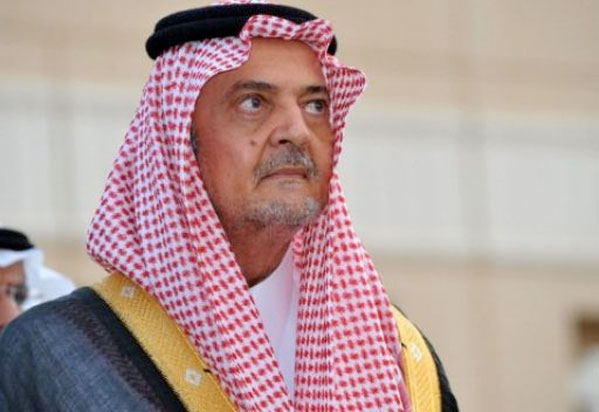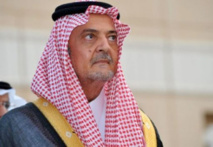Prince Saud was one of the highest profile members of the kingdom's ruling elite before stepping down in April for health reasons.
He oversaw Saudi Arabia's emergence as a major diplomatic player, facing successive regional crises and maintaining a focus on relations with the West.
"He was a symbol of honesty and hard work," the Royal Court said.
Relatives earlier announced Saud's death on social media.
"May God accept him in paradise," a nephew, Saud Mohammed al-Abdullah al-Faisal, wrote on Twitter.
"I wish I could deny the rumour of the news of your death," foreign ministry spokesman Osama Nugali tweeted.
Arab League Chief Nabil al-Arabi expressed his condolences in a statement, as did Germany's embassy in Riyadh calling Prince Saud a "respected statesman".
French Foreign Minister Laurent Fabius said in a statement that the top diplomat had "worked tirelessly for peace and stability in the Middle East".
Saud was replaced as foreign minister in April by Washington ambassador Adel al-Jubeir in a major shake-up of the Saudi royal family and cabinet.
His departure came as Saudi Arabia leads a coalition of Arab states bombing Iran-backed rebels in Yemen and takes part in the US-led campaign against the Islamic State group in Syria and Iraq.
In his last public address in the Saudi capital, Prince Saud in April said the Sunni kingdom "was not at war with Tehran" but called on its Shiite regional rival Iran to stop arming rebels in Yemen.
Iran has denied giving weapons to the Huthi rebels.
- Four decades in office -
Saud served under four monarchs, and took his final oath of office in March after King Salman acceded to the throne following the January death of King Abdullah, when Saud was in the US for back surgery.
He was first named foreign minister in October 1975, seven months after his father, King Faisal, was assassinated by a nephew.
He was closely involved in efforts to end the 1975-1990 civil war in Lebanon and led the kingdom's foreign policy during the 1980-1988 Iraq-Iran war, Iraq's 1990 invasion of Kuwait and the 1991 Gulf War in which US-led forces used Saudi Arabia as a launchpad.
But ties with Riyadh's longtime ally Washington were sometimes strained, including after the September 11, 2001 attacks on the US, in which 15 of 19 plane hijackers were Saudi.
Tensions eased after Riyadh began waging its own war on suspected Al-Qaeda militants who launched a spate of bombings and shootings in the kingdom in 2003.
While Saud frequently visited Washington or received US officials in Saudi Arabia, he was believed to be closer to European diplomats.
The prince often swapped his traditional Saudi thobe and checkered shemagh headdress for elegant suits when on missions in Western capitals.
Born in the southwestern mountain resort of Taif, Saud graduated with an economics degree from Princeton University in New Jersey in 1964.
He came to the foreign ministry after stints at state oil product firm Petromin and the ministry of oil and mineral resources.
The prince was married with three sons and three daughters.
-----------------------------------------------------------------------------------------------------------------------
He oversaw Saudi Arabia's emergence as a major diplomatic player, facing successive regional crises and maintaining a focus on relations with the West.
"He was a symbol of honesty and hard work," the Royal Court said.
Relatives earlier announced Saud's death on social media.
"May God accept him in paradise," a nephew, Saud Mohammed al-Abdullah al-Faisal, wrote on Twitter.
"I wish I could deny the rumour of the news of your death," foreign ministry spokesman Osama Nugali tweeted.
Arab League Chief Nabil al-Arabi expressed his condolences in a statement, as did Germany's embassy in Riyadh calling Prince Saud a "respected statesman".
French Foreign Minister Laurent Fabius said in a statement that the top diplomat had "worked tirelessly for peace and stability in the Middle East".
Saud was replaced as foreign minister in April by Washington ambassador Adel al-Jubeir in a major shake-up of the Saudi royal family and cabinet.
His departure came as Saudi Arabia leads a coalition of Arab states bombing Iran-backed rebels in Yemen and takes part in the US-led campaign against the Islamic State group in Syria and Iraq.
In his last public address in the Saudi capital, Prince Saud in April said the Sunni kingdom "was not at war with Tehran" but called on its Shiite regional rival Iran to stop arming rebels in Yemen.
Iran has denied giving weapons to the Huthi rebels.
- Four decades in office -
Saud served under four monarchs, and took his final oath of office in March after King Salman acceded to the throne following the January death of King Abdullah, when Saud was in the US for back surgery.
He was first named foreign minister in October 1975, seven months after his father, King Faisal, was assassinated by a nephew.
He was closely involved in efforts to end the 1975-1990 civil war in Lebanon and led the kingdom's foreign policy during the 1980-1988 Iraq-Iran war, Iraq's 1990 invasion of Kuwait and the 1991 Gulf War in which US-led forces used Saudi Arabia as a launchpad.
But ties with Riyadh's longtime ally Washington were sometimes strained, including after the September 11, 2001 attacks on the US, in which 15 of 19 plane hijackers were Saudi.
Tensions eased after Riyadh began waging its own war on suspected Al-Qaeda militants who launched a spate of bombings and shootings in the kingdom in 2003.
While Saud frequently visited Washington or received US officials in Saudi Arabia, he was believed to be closer to European diplomats.
The prince often swapped his traditional Saudi thobe and checkered shemagh headdress for elegant suits when on missions in Western capitals.
Born in the southwestern mountain resort of Taif, Saud graduated with an economics degree from Princeton University in New Jersey in 1964.
He came to the foreign ministry after stints at state oil product firm Petromin and the ministry of oil and mineral resources.
The prince was married with three sons and three daughters.
-----------------------------------------------------------------------------------------------------------------------









 Home
Home Politics
Politics











